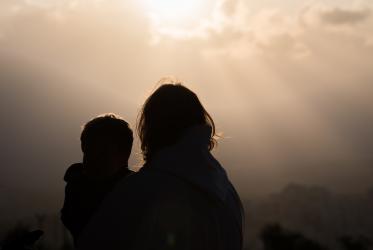Charity Concert
Ecumenical Reflections
I have been asked to offer a few remarks, some words to and about the cry we just heard from the organ. If it were not this time of the year, and if this event were not taking place during the evening, you would have read the text on the sign outside this building:
God of Life, Lead Us to Justice and Peace
This is the theme the World Council of Churches has chosen for its Assembly next year in Korea. This is a prayer that comes to my mind whenever the trauma and humiliation that girls and young women go through are narrated. How can we live our faith in the God of life, who actively calls us to work for justice and peace, addressing such realities that threaten the life of 6000 girls every day? No one person alone, no one Christian tradition alone, no one faith alone can actually successfully resist the forces striving against life, justice and peace.To bring the active reign of the God of life, and to work for justice and peace, we need to work together—as we are doing right now together with the Global Alliance against FGM; this includes even those of us who are far from the daily realities of this pain and humiliation.
For the WCC, the realities of FGM as an expression of violence against women came into focus especially during the Ecumenical Decade of Churches in Solidarity with Women (1988-1998). As teams of Living Letters composed of sisters and brothers from WCC member churches, as well as from our ecumenical sister organizations and ecumenical partners, went out to all the regions of the world, they listened to stories of how girls’ and women’s dignity and rights and even health and lives are violated, sometimes even in the name of religion. We received testimonies of the resilience and determination of women to overcome oppression and violence.
This helped ecumenical women to participate and make strategic contributions to the 1995 UN Fourth International Conference on Women in Beijing, whose plan of action lifted up economic justice for women, access to health care and family planning, participation of women in social and policy planning, violence against women, rights of women in inheritance, and women's roles in creating and promoting peace, as central issues.
Through the WCC’s programmes, Ecumenical HIV and AIDS Initiatives in Africa (EHAIA) and Women in Church and Society, the WCC has continued leading the search for just peace in the face of violence against women, an effort expressed in different forms, including FGM, that we are focusing on this evening.
Throughout all this, the WCC has made it very clear that violence against women in all its dimensions is a sin. We therefore continue to hold ourselves accountable for the elimination of violence and the renewal of our commitment to justice and peace among women, men and children in all levels of our life, work and witness. Allow me to add a personal word particularly to religious leaders. As religious leaders, we cannot work for human rights and the rights of religious freedom without ending gender based violence and the violation of women’s rights, especially when such perpetration is enacted in the name of religion. We must work together with leaders in civil society toward this end.
We are therefore thankful to God for graciously honouring our efforts together through so many positive results, but especially on a global level for the resolution, adopted by consensus by the UN General Assembly's human rights committee on 27 November 2012, which calls FGM a “harmful and a serious threat to the psychological, sexual and reproductive health of women and girls.”
Although this resolution does not mean that this dehumanizing practice has suddenly been brought to an end, it is a breakthrough that gives all of us momentum for further work. This includes advocacy with governments through our churches, religious and ecumenical partners so that such an important resolution may be implemented. So we continue praying all the way to our 10th Assembly in Busan, Korea (2013), “God of Life, Lead us to Justice and Peace”!
WCC general secretary
Rev. Dr Olav Fykse Tveit



